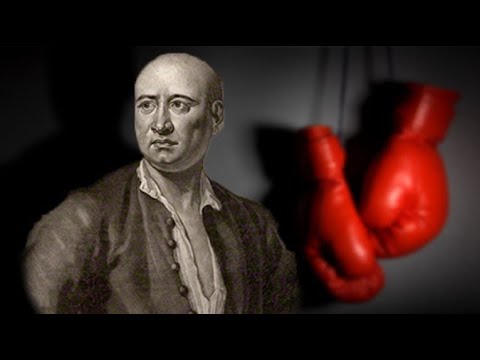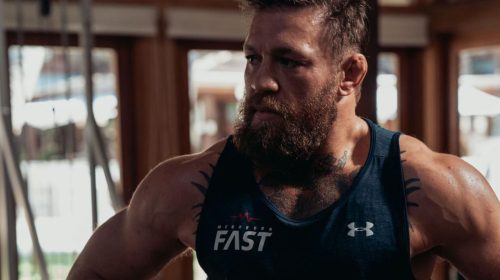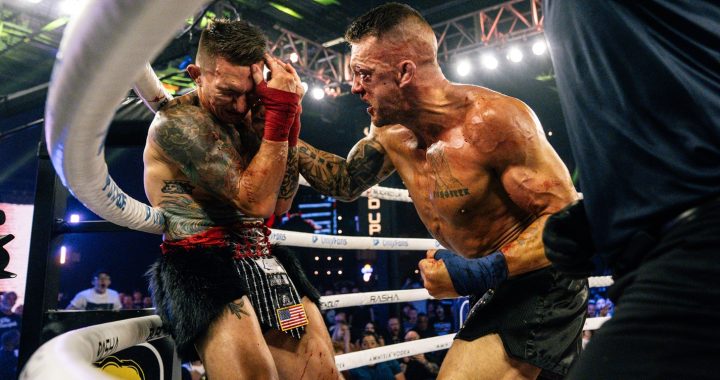
James Figg: England’s First Ever Bare-Knuckle Boxing Champion!
James Figg was born in the small Oxfordshire town of Thame in 1684 during the reign of William III. Little is known of Figg’s early upbringing, other than the fact that he made his name as a master swordsman and prize-fighter in his local area by taking on all-comers at Oxfordshire fairs. At one such fair, Figg’s talents were discovered by the third Earl of Peterborough, Charles Mordaunt, who offered to fund Figg’s exploits. Through the generous donations of Mordaunt, Figg was able to move his business to London, setting up his own prize-fighting booth at Southwark fair.
By 1719 Figg had defeated all who dared to face him and proudly proclaimed himself heavyweight champion of England (the first to be officially recognised as such). That same year, Figg would establish the English School of Arms and Art of Self-Defence Academy known as Figg’s amphitheatre on Tottenham Court Road. Here, Figg would pass on his expertise of sword, staff and knuckle to keen students of pugilism and hold regular bouts and sparring exhibitions for public entertainment.
During the early eighteenth-century bare-knuckle boxing was yet to become a formalised sport. It would not be until 1743 with the establishment of Broughton rule’s that prize-fighting began to resemble its modern counterpart, instead, the sport Figg frequented was more a mixture of swordplay and no-holds barred fighting. Contests ranged from fencing bouts involving swords or quarterstaffs to bare-knuckle fights that permitted grappling and throws.
Figg excelled in all disciplines, particularly swordplay. He was noted by contemporaries to be a fighter rich in dexterity, resolution and bravery. A former pupil Captain John Godfrey wrote “he was just as much a greater master than any other I ever saw, as he was a greater judge of time and measure” (Godfrey, 1747).
Figg retired and vacated his English heavyweight crown in 1730, sporting a rather impressive 269-1 record. The sole blemish came in his first encounter with Gravesend pipe maker Ned Sutton in 1724, triggering a rivalry between the two gentlemen that was settled by an epic trilogy. Figg bested his rival on the two remaining occasions, winning the rematch in 1725 and the rubber match in 1727. The famous third bout was contested over three separate disciplines, broadsword, fist and quarterstaff, with Figg winning all three rounds to claim the contest. A report of the fight is recorded in all its glory by poet John Byrom (1692-1763):
I.
“LONG was the great Figg, by the prize-fighting swains,
Sole monarch acknowledg’d of Mary-bone plains:
To the towns, far and near, did his valour extend,
And swam down the river from Thame to Gravesend;
Where liv’d Mr. Sutton, pipemaker by trade,
Who hearing that Figg was thought such a stout blade,
Resolv’d to put in for a share of his fame,
And so sent to challenge the champion of Thame.”
II.
“With alternate advantage two trials had past,
When they fought out the rubbers on Wednesday last.
To see such a contest the house was so ful
There hardly was room left to thrust in your skull.
With a prelude of cudgells we first were saluted,
And two or three shoulders most handsomely fluted;
Till weary at last with inferior disasters,
All the company cry’d, come, the masters, the masters.”
III.
“Whereupon the bold Sutton first mounted the stage,
Made his honours as usual, and yearn’d to engage;
Then Figg, with a visage so fierce, yet sedate,
Came, and enter’d the lists, with his fresh-shaven pate;
Their arms were encircled with armigers too,
With a red ribbon Sutton’s, and Figg’s with a blue.
Thus adorn’d the two heroes, ‘twixt shoulder, and elbow,
Shook hands, and went to ‘t, and the word it was Bilboe.”
IV.
“Sure such a concern in the eyes of spectators,
Was never yet seen in our amphi-theatres.
Our commons and peers from their several places,
To half an inch distance all pointed their faces;
Wnile the rays of old Phoebus, that shot thro’ the sky-light,
Seem’d to make on the stage a new kind of twilight;
And the Gods without doubt, if one cou’d but have seen ’em,
Were peeping there thro’ to do justice between ’em.”
V.
“Figg struck the first stroke, and with such a vast fury,
That he broke his huge weapon in twain, I assure you;
And if his brave rival this blow had not warded,
His head from his shoulders had quite been discarded.
Figg arm’d him again, and they took t’ other tilt,
And then Sutton’s blade ran away from its hilt;
The weapons were frighted, but as for the men,
In truth they ne’er minded, but at it again.”
VI.
“Such a force in their blows, you’d have thought it a wonder
Every stroke they receiv’d did not cleave ’em asunder.
Yet so great was their courage, so equal their skill,
That they both seem’d as safe as a thief in a mill;
While in doubtful attention dame Victory stood,
And which side to take cou’d not tell for her blood,
But remain’d like the ass, ‘twixt the bundles of hay,
Without ever stirring an inch either way.”
VII.
“Till Jove to the Gods signified his intention
In a speech that he made ’em too tedious to mention;
But the upshot on ‘t was, that at that very bout,
From a wound in Figg’s side the hot blood spouted out;
Her ladyship then seem’d to think the case plain,
But Figg stepping forth with a sullen disdain,
Shew’d the gash, and appeal’d to the company round,
If his own broken sword had not given him the wound.”
VIII.
“That bruises, and wounds a man’s spirit shou’d touch,
With danger so little, with honour so much!
Well, they both took a dram, and return’d to the battle,
And with a fresh fury they made the swords rattle;
While Sutton’s right arm was observed to bleed,
By a touch from his rival; so Jove had decreed;
Just enough for to shew that his blood was not icor,
But made up, like Figg’s, of the common red-liquor.”
IX.
“Again they both rush’d with as equal a fire on,
‘Till the company cry’d, hold, enough of cold iron,
To the quarter-staff now, lads. So first having dram’d it,
They took to their woods, and i’ faith never sham’d it.
The first bout they had was so fair, and so handsome,
That to make a fair bargain, was worth a king’s ransom;
And Sutton such bangs on his neighbour imparted,
Wou’d have made any fibres but Figg’s to have smarted.”
X.
“Then after that bout they went on to another—
But the matter must end on some fashion, or other;
So Jove told the Gods he hath made a decree,
That Figg shou’d hit Sutton a stroke on the knee.
Tho’ Sutton disabled as soon as he hit him
Wou’d still have fought on, but Jove wou’d not permit him;
‘Twas his fate, not his fault, that constrain’d him to yield,
And thus the great Figg became lord of the field.”
(Byrom, 1763)
Upon his retirement, Figg had already cemented a lasting legacy. Figg’s ampitheatre became intrinsically linked with pugilism, and produced several fine bare-knuckle protégé’s including George Taylor, Bob Whittaker and Jack Broughton. He was the first man to be widely recognised as the Champion of England and was only beaten once, which he avenged.
Despite being noted as a keener swordsman than bare-knuckle boxer, he nevertheless brought the sport to the forefront of 18th century entertainment, as part of his pugilistic deeds. His fame allowed him to socialize in elitist circles providing Figg with the appropriate influence to popularise prize-fighting with royal family members such as Frederick Louis, the then Prince of Wales. He is without question the grandfather of bare-knuckle boxing, a sport which would be developed further by his aforementioned student, Jack Broughton, with the introduction of the Broughton rules.
Yet still, Figg is often forgotten when it comes to lists of great pugilists. Perhaps he is overshadowed by his finest student Jack Broughton, or maybe it is the multitude of great bare-knuckle boxers from over the pond, such as John L. Sullivan and Tom Hyer. Regardless, Figg is one of the greatest swordsman and bare-knuckle fighters of the pugilistic era and should be hailed as such. If it wasn’t for Figg perhaps bare-knuckle boxing would never have reached the lofty heights it has today, and that is a scary thought.
References:
Byrom, J. (1763). Extempore Verses upon a Trial of Skill between the two great Masters of Defence, Messieurs Figg and Sutton. In: Dodsley, Robert, ed. A collection of poems in six volumes, 1703-1764. London: J. Hughs, pp. 286-289. https://quod.lib.umich.edu/e/ecco/004887768.0001.006/1:3.71?rgn=div2;view=fulltext
Godfrey, J. (1747). A Treatise Upon the Useful Science of Defence. London: Robinson. https://books.google.co.uk/books?id=mOBbAAAAQAAJ

























